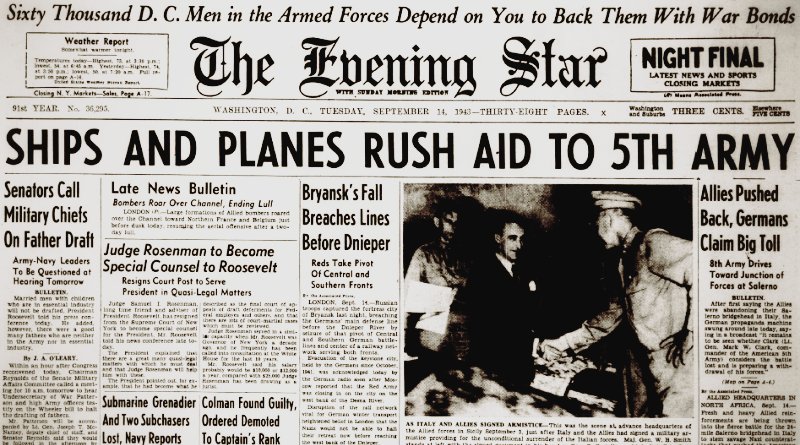World War II Chronicle: September 14, 1943
Click here for TODAY’S NEWSPAPER
Lt. Gen. Mark Clark’s Fifth Army is facing serious opposition from German troops near Salerno, Italy. Nazi radio claims that ships are being loaded with soldiers and evacuating them out to sea. The story begins on the front page and a map is on page six… George Fielding Eliot column on page 10… Sports on page 14…
On page 21, a Navy field doctor describes what it was like on Guadalcanal. The officer was assigned to 1st Battalion, 7th Marines — Lt. Col. Chesty Puller’s outfit.
Roving Reporter by Ernie Pyle
SOMEWHERE IN SICILY — The backbone of any army company is the first sergeant. I know one who is a beat.
His name, of all things, Adelard Levesque. It’s pronounced “Levek” and soldiers call him “Pop.” He’s 42 years old, but doesn’t look it.
Of all the thousands of men I’ve met in the Army, he comes the nearest to being the fictional version of the tough, competent, old-line first sergeant. Levesque was in the last war as a mere boy. He fought in France and stayed on with the Army of Occupation in Germany until 1921.
He isn’t a Regular Army man. He spent 20 years out in the big world between wars raising a family, making a living and seeing and doing things. He has been a West Coast iron worker and practically anything else you can mention. He has four sons in the Army and, if I remember correctly, one daughter in the Navy.
He calls Marysville, Calif., his home. He is a ruggedly handsome fellow with a black mustache and clothes that are always neat, even when dirty. His energy never runs down. He talks loud and continuously. He curses fluently and orders everybody around, including officers.
At first my mouth hung open in amazement until gradually I began to catch the spirit of Levesque. He isn’t smart alecky nor fresh. It’s just that he’s a natural-born center of any stage. He’s a leader, and he’s one of these gifted, practical men who can do anything under the sun, and usually do it better than the next fellow.
To top it all off he speaks perfect French and is picking up Italian like a snowball. One of his commanders told me, “He talks too much and too big, but he can back up every word he says. I sure hope we never lose him.”
I asked one enlisted man about him since they are the ones his tongue falls on most heavily. The man said, “Hell, I don’t know what this company would do without him. Sure he talks all the time, but we don’t pay any attention. Listen at him beatin’ his gums, now. He musta got out on the wrong side of the bed this morning.”
Actually, the Sergeant isn’t so ferocious. He is widely informed, and his grammar is excellent. He can discuss politics as well as bulldozers. He is alert to your own conversation and to every little thing that goes on.
One day on a mountain road, he stopped our jeep and asked the driver some questions. As he walked back to his own jeep, he turned and ordered my driver, “Go get those maps. Send a bulldozer back up here. Bring five gallons of gas, and get your spare tire fixed. “Damit, why don’t you take care of your vehicle.”
“Spare tire?” the driver asked.
“Yes, damit,” the Sergeant roared. “It’s flat.”
He had discovered it merely by the slight pressure of his hand as he leaned against it while talking to us. Everything he does is like that.
If you could have been on hand during the last half-hour of work on the Point Calava bridge I’ve written about recently, you would have seen as fine a drama as ever you paid $8.80 a seat for in New York.
The bridge is almost finished. The climax of 24 hours of frenzied work has come. Everybody is through. Only one man can do the final touches of bracing and balancing. That man is sitting on the end of a beam way out there over the chasm, a hammer in his hand, his legs wrapped around the beam as though he were riding a broncho.
The squirrel out there on the beam is, of course, Sergeant Levesque. He wears his steel helmet and his pack harness. He never takes it off, even though the day is sweltering.
His face is dirty and grave and sweating. he is in complete charge of all he surveys. On the opposite bank of the crater, two huge soldier audiences stand watching this noisily profane craftsman play out his role.
Their preoccupation is a tribute to his skill. I’ve never seen a more intent audience. It includes all ranks, from privates to generals.
“Gimme some slack. Gimme some slack, damit,” the Sergeant yells to the winch man on the bank. “That’s enough — hold it. Throw me a sledge. Where the hell’s a spike, damit? Hasn’t anybody got a spike?
“How does that look from the bank now, Colonel? She about level? Okay, slack away. Watch that airhose. Let her clear down. Hey you under there, watch yourself, damit.”
Sergeant Levesque drives the final spike deeply with his sledge. He looks around at his work and finds it finished.
With an air of completion he clambers to his feet and walks the narrow beam back to safety. You could almost sense the curtain going down, and I know everybody in the crowd had to stifle and impulse to cheer.
If somebody writes another “What Price Glory” after this war I know who should play the leading role. Who? Why, Sergeant Levesque, who do you suppose?
Evening star. (Washington, D.C.), 14 September 1943. Chronicling America: Historic American Newspapers. Lib. of Congress.
https://chroniclingamerica.loc.gov/lccn/sn83045462/1943-09-14/ed-1/
